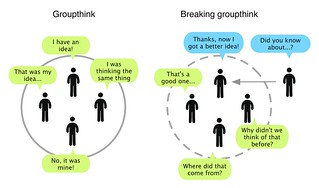Someone came up with a great phrase in a workshop recently - "Intellectual Inbreeding"
What they meant by Intellectual Inbreeding is the sort of restricted group think you get when ideas or practices have been the province of a small group of people, and they have become stuck in a set of shared views and opinions which are impervious to (or oblivious of) external views.
On this blog I have often referred to this as "knowledge bubbles" (see the Brexit example, the Hitler/Stalin example, the social media echo chamber, and how to burst the knowledge bubbles, perhaps through a lesson escalation route).
Intellectual Inbreeding is what happens when the pool of ideas is too limited, and people can't think outside the box, to bring in new ideas and topics. Intellectual inbreeding results in a restricted "meme pool", and can lead to catastrophic error. I recommend Christopher Burns' excellent book "Deadly Decisions - how false knowledge sank the titanic, blew up the shuttle and led America into war" for some scary examples
On a smaller scale, we see this intellectual inbreeding very clearly in our famous and powerful Bird Island Knowledge Management exercise, where groups can get stuck on a particular design, and can't see the wider possibilities. Maybe they have built a design that reaches 60cm, and think that if they really push everything to the limits, they might reach 75cm, little knowing that the best practice design is far far taller.
The way to beat Intellectual Inbreeding is to bring in ideas from elsewhere, from outside the meme pool. You can do this through peer assist, for example, or through knowledge learning visits. In the Bird Island game, we open the doors and bring in people from other teams to share their knowledge and ideas. Often, while the team was racking their brains to take their design up to 75 cm, a member from another team might come in having built a design that already reaches 120 cm.
What happens then, is dramatic. You can almost see the scales falling from people's eyes, and you can almost hear the sound of the penny dropping, or the bubble bursting.





1 comment:
Hi Sunita,
on April 3rd and 4th there will be a UN Conference in Geneva on Knowledge for Development. You may keep an eye on it. Announcement should be made the next few days.
Cheers
Guenter Koch
Post a Comment